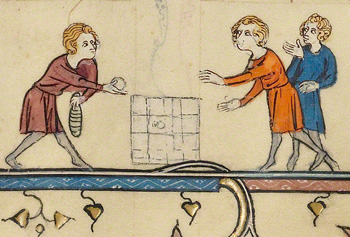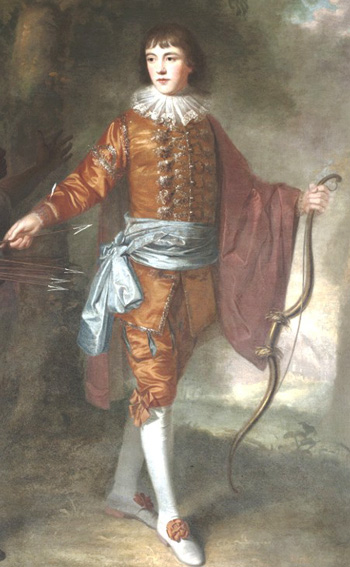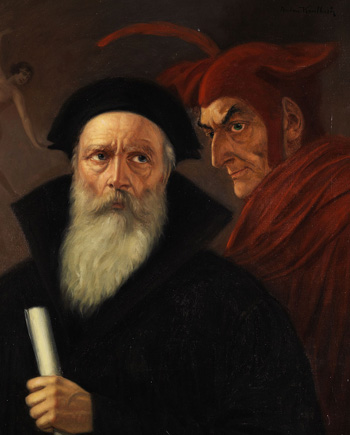Catholic Virtues
 |
 |
 |
 |
 |
 |
 |
True & False Paths to Happiness - VI
The Fight Is another Dimension of Innocence
It is natural for a boy to grow up with other boys and young men. Instinct and sociability demand this: He has to sound out ideas and form opinions about what interests him. As he grows, the world of birds and butterflies takes a back step.
At that time, if the child is really innocent, he will have to face a trial that was only a bare sketch in the previous phase. What enters in his world is evil, suffering, a difficult fidelity, a reaction to the aggression he experiences and the struggle, the battle.
 If innocence is maintained, the battle takes on another character. He starts to consider and face the world of souls, which he did not know.
If innocence is maintained, the battle takes on another character. He starts to consider and face the world of souls, which he did not know.
He also acquires the notion of the horrible, which before he only vaguely had, which can come to be a long shadow in one's life.
This combat ends up becoming one of the poles of life, outside of which innocence is not innocence. When he is successful in this battle, his person is greatly enriched, forming a kind of second innocence on top of the first: Second in every way, because it is much more conscious, much better understood and more greatly desired; above all, because it is clarified by the contradiction.
The boy is closed like a fortress. From the open garden of childhood, he closes himself inside his own walls. But, at the same time, he also defines himself: "I will not be like the others. I am myself and, whatever the cost, I will be who I am. I will remain myself. I am not the others and I will fight with the others if necessary."
It is a maturation of the soul in every sense of the word. But it is also the acquisition of a new dimension of innocence.
The temptation of Faust
But – alas! – as with Adam and Eve in the Terrestrial Paradise, at a certain point a temptation comes: That world of original beauties and certainties is presented as something very high, very distant and of little use. It needs to be removed.
The tendency to leave aside innocence is slowly born in the child. He vaguely has this thought: '"These things are nothing but fantasies. They are unreal and should not be taken into consideration." This is a temptation that can kill his innocence!
 If Catholic, the mother or father may teach the child to pray the Hail Mary – which is a precious thing! – but it may not be sufficient to sustain him in this battle. For the sense of order characteristic of innocence is in a sphere that requires a special labor; the common care will not suffice.
If Catholic, the mother or father may teach the child to pray the Hail Mary – which is a precious thing! – but it may not be sufficient to sustain him in this battle. For the sense of order characteristic of innocence is in a sphere that requires a special labor; the common care will not suffice.
Before being tempted, the child may have loved the good with a certain exclusivity, that is, rejecting what is opposed to it. If so, when the temptation enters, he is armed. If he loved the good without exclusivity, but because it was pretty or comfortable, he is unarmed.
It is in the child's earliest relationship with the good that he often defines himself.
In a roundabout way, as a child would think, the question arises: "Right now I have the approval of others. Do I consent to be different from them if necessary? And even to become completely isolated? To take on the risk and adventure of a life different from everyone else's and that seems inferior to that of others?"
Then, he goes to school. Many times school life is a river that runs in the opposite direction of innocence.
Facing this new challenge, a boy often thinks, more or less explicitly: "Everything before was just froth. Soap bubbles! Look at the other side – the value and greatness of material things. That is where one finds prestige, wealth, fame, physical beauty and every type of pleasure. See the crazy life I will lead if I don't choose this! I will be a fakir, an anchorite, a hermit. If I choose innocence, I am running after a dream...'
It is the temptation of Faust, Goethe's fictional character who sold his soul to the Devil in exchange for advantages in earthly life, which presents itself in childish terms.
Something similar can happen in the head of a person who maintained his innocence into adulthood.
Impurity generates agitation & misfortune for a lifetime
 Because of the sexual precocity that dominates in the tropics, I realized that impurity becomes a predominant mania very early
in a young man's life. Everything that is not impure starts to appear monotonous.
Because of the sexual precocity that dominates in the tropics, I realized that impurity becomes a predominant mania very early
in a young man's life. Everything that is not impure starts to appear monotonous.
These tendencies are completely contrary to how I understood life should be. I saw that impurity brought a complete disorder with it. It offered a certain pleasure and a certain delight for the moment, but it spread agitation and misfortune throughout one's life. I understood that impurity is a fire. And I realized that, if I wanted to keep that beautiful and noble placidity I was accustomed to, I should keep myself pure and make every effort to have purity in my life.
I also quickly realized that the impure were dirty: They rolled on the floor, mixed with the dust, had dirty fingers, did not wash. The sense of cleanliness disappeared or waned with impurity.
Continued

At that time, if the child is really innocent, he will have to face a trial that was only a bare sketch in the previous phase. What enters in his world is evil, suffering, a difficult fidelity, a reaction to the aggression he experiences and the struggle, the battle.

When a child enters in contact with companions, his innocence is tested
He also acquires the notion of the horrible, which before he only vaguely had, which can come to be a long shadow in one's life.
This combat ends up becoming one of the poles of life, outside of which innocence is not innocence. When he is successful in this battle, his person is greatly enriched, forming a kind of second innocence on top of the first: Second in every way, because it is much more conscious, much better understood and more greatly desired; above all, because it is clarified by the contradiction.
The boy is closed like a fortress. From the open garden of childhood, he closes himself inside his own walls. But, at the same time, he also defines himself: "I will not be like the others. I am myself and, whatever the cost, I will be who I am. I will remain myself. I am not the others and I will fight with the others if necessary."
It is a maturation of the soul in every sense of the word. But it is also the acquisition of a new dimension of innocence.
The temptation of Faust
But – alas! – as with Adam and Eve in the Terrestrial Paradise, at a certain point a temptation comes: That world of original beauties and certainties is presented as something very high, very distant and of little use. It needs to be removed.
The tendency to leave aside innocence is slowly born in the child. He vaguely has this thought: '"These things are nothing but fantasies. They are unreal and should not be taken into consideration." This is a temptation that can kill his innocence!

To maintain innocence the boy must win a battle and protect the marvelous world he loves
Before being tempted, the child may have loved the good with a certain exclusivity, that is, rejecting what is opposed to it. If so, when the temptation enters, he is armed. If he loved the good without exclusivity, but because it was pretty or comfortable, he is unarmed.
It is in the child's earliest relationship with the good that he often defines himself.
In a roundabout way, as a child would think, the question arises: "Right now I have the approval of others. Do I consent to be different from them if necessary? And even to become completely isolated? To take on the risk and adventure of a life different from everyone else's and that seems inferior to that of others?"
Then, he goes to school. Many times school life is a river that runs in the opposite direction of innocence.
Facing this new challenge, a boy often thinks, more or less explicitly: "Everything before was just froth. Soap bubbles! Look at the other side – the value and greatness of material things. That is where one finds prestige, wealth, fame, physical beauty and every type of pleasure. See the crazy life I will lead if I don't choose this! I will be a fakir, an anchorite, a hermit. If I choose innocence, I am running after a dream...'
It is the temptation of Faust, Goethe's fictional character who sold his soul to the Devil in exchange for advantages in earthly life, which presents itself in childish terms.
Something similar can happen in the head of a person who maintained his innocence into adulthood.
Impurity generates agitation & misfortune for a lifetime

The temptation of Faust for a boy is to sell his innocence to fit in the world
These tendencies are completely contrary to how I understood life should be. I saw that impurity brought a complete disorder with it. It offered a certain pleasure and a certain delight for the moment, but it spread agitation and misfortune throughout one's life. I understood that impurity is a fire. And I realized that, if I wanted to keep that beautiful and noble placidity I was accustomed to, I should keep myself pure and make every effort to have purity in my life.
I also quickly realized that the impure were dirty: They rolled on the floor, mixed with the dust, had dirty fingers, did not wash. The sense of cleanliness disappeared or waned with impurity.
Continued

Posted March 20, 2020





